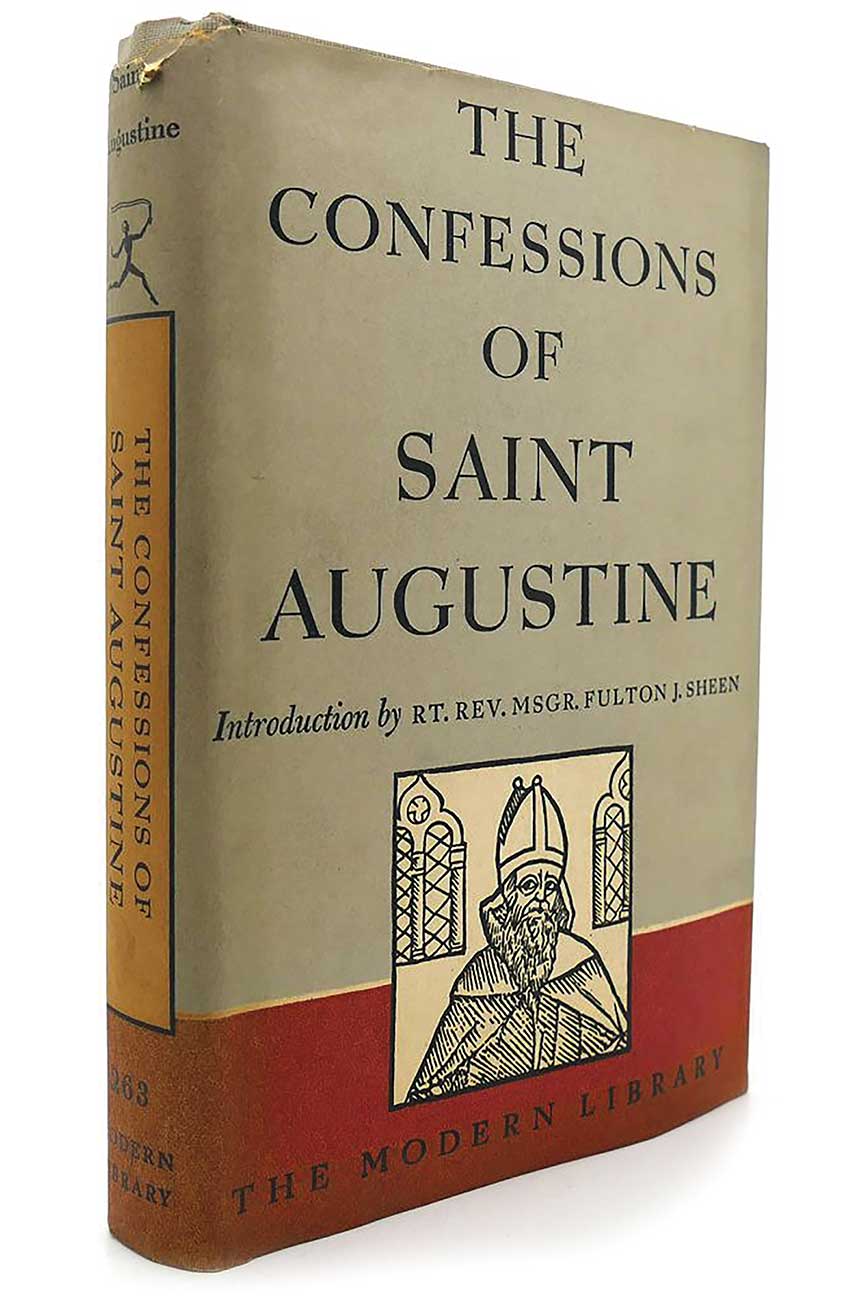
Find Your Seat
A sampling of courses that inspire Villanova students to think critically and creatively
With more than 4,000 courses offered each semester, there’s no doubt Villanova scholars have a vast array of options. In each issue of Villanova Magazine, we invite readers to “sit in” on one of these standout courses in our Find Your Seat column, examining innovative and unusual topics available to undergraduate, graduate and Law students across the University's six colleges. This issue, we decided to increase our course load to eight.
Like Villanova’s broad range of course offerings, this sampling runs the disciplinary gamut—from the science behind personal DNA testing to how data informs player evaluation in sports. But they all have one thing in common: they are rooted in the Augustinian tradition that intellectual curiosity leads to self-discovery.
Three Life Lessons from St. Augustine
AUGUSTINE AND CULTURE SEMINAR
From Day 1, first-year students are immersed in a community of learners like none other. In the Augustine and Culture Seminar, more commonly known as ACS, a mix of Engineering, Nursing, Business, Liberal Arts and Sciences undergraduates are divided into groups of 16 to embark on a journey of growth modeled after the Augustinian ideals of truth, unity and love.
Reflecting on the 4th-century North African bishop who’s the centerpiece of the course, Marylu Hill, PhD, ’84 CLAS, program director from 2011 to 2021, notes that St. Augustine resonates with young people in ways they don’t expect. And it’s these lessons that he continues to impart that make him an incredibly powerful role model.
1. Reading Is a Superpower.
Regarded as one of the most influential thinkers of all time, St. Augustine began his quest for wisdom with the greatest books of his time. ACS students embark on a similar path, analyzing essential classical texts and modern responses with the guidance of their instructors. While careful reading, effective writing and critical thinking might seem like basic concepts, they take a lot of time and effort to do well. But once Villanovans master these skills, they are a triple threat when entering the working world, Dr. Hill says.
2. We’re Stronger Together.
“One of the things St. Augustine writes about in Confessions is seeking higher truths but doing so in the spirit of friendship with other individuals who are also questioning,” says Noël Falco Dolan ’90 CLAS, director of Academic Learning Communities for Villanova’s ACS Program. “That’s important to us as we’re forming this community of scholars—students who are undertaking an academic journey in communion with others is what it means to be at Villanova.”
3. Always Let Caritas Be Your Guide.
At a time when civil discourse seems to be waning, ACS promotes conversation across differences. “We’re teaching students civility through the Augustinian ideal of Caritas, or love,” says Dr. Hill. “When they care about each other, they are more willing to work through differences—even in discussing thorny questions. These days, that’s a rare and valuable skill.”

What the Holocaust Can Teach Lawyers Today
LAWYERS AND THE HOLOCAUST
How could the Holocaust happen?
Lawyers and the Holocaust, a Villanova Law course, asks this and many other questions as students examine the history and ethics of the legal profession in Germany prior to the ascension of the Nazi Party, and then during the Nazi period.
Steven Chanenson, JD, the faculty director of the David F. and Constance B. Girard-diCarlo Center for Ethics, Integrity and Compliance, describes the seminar course as both forward- and backward-looking. “It’s not about obvious answers,” he explains. “It’s all about questions.” These questions, which students might not typically ask, have clear relevance for lawyers today.
How do we encourage lawyers to step up when they see something happening that’s inappropriate?
What should they do when they see things that cross the line into arguably immoral yet still legal territory?
How do we encourage lawyers to do more than just follow the rules?
How do we inspire them to embrace the highest ideals of professional conduct?
“ It’s not about obvious answers. It’s all about questions. ”
- Steven Chanenson, JD
Students gained insights from internationally known experts, including Richard H. Weisberg, the Walter Floersheimer Professor of Constitutional Law at Yeshiva University’s Cardozo Law School. He led the class through an exercise he drafted that imagined a British-trained lawyer in the occupied Channel Islands assigned a task to decide, as the law applied at the time, whether a person should be considered Jewish and thus subject to various restrictions and prohibitions.
“Should lawyers treat this like any other legal puzzle and decide how these laws and rules apply?” Chanenson asks, describing the ensuing discussion. “Should they try to shade those answers in order to help protect the person who’s being accused, or should the lawyer say, ‘I don't want to have anything to do with this kind of a system’?”
Chanenson acknowledges that the Holocaust is incomprehensible in so many ways that drawing the analogy to our current lives can seem difficult at first blush. “But the more you delve into it, the more you see not only the horrors, but also the mundane things in the ordinary operation of the legal system,” he says. “From there, we can explore the ways in which the legal profession went wrong and how we can try to prevent that from ever happening again.” —Nelson Rice
Wondering About End of the World Reading
21ST-CENTURY AMERICAN APOCALYPSE
For Heather Hicks, PhD, her fascination with the apocalyptic genre goes back to the Book of Revelation. From there, she has traced a rich tradition of fiction that offers countless ways of thinking about the world and how it ends. English Department chair and author of the 2016 book The Post Apocalyptic Novel in the 21st Century, Dr. Hicks discusses teaching about catastrophe in the middle of a pandemic.
Q. Why the interest in apocalyptic fiction?
A. This is a genre that has been around since the beginning of human civilization—some of the very oldest myths about the human experience are about the end of the world, and we’re still here.
Q. What does the course encompass?
A. It is a fiction course focused on seven novels published since 2000 that are written about scenarios of catastrophe in the US, but not all of the authors are American.
Q. How did the course come about?
A. I was asked to write an article for a 2020 Cambridge University Press volume titled Apocalyptic Literature in American Literature and Culture—that was the original impetus. It’s always nice when your research is in line with your teaching.
Q. Which course reading might surprise students most?
A. To start, we read select chapters of the Book of Revelation in the New Testament. As a scholar of this field, I just know you can’t claim any expertise without understanding the lingering effects of this section of the Bible on images of apocalypse in literature.
For Your Must-Read List:
The Road
by Cormac McCarthy
The End of October
by Lawrence Wright
The Walking Dead
by Robert Kirkman
Zone One
by Colson Whitehead
American War
by Omar El Akkad
Oryx and Crake
by Margaret Atwood
The Power
by Naomi Alderman
Show Me the Data
SPORTS ANALYTICS
There isn’t a sports fan who hasn’t been left wondering why the coach called a particular play or traded a star player. More and more frequently, these decisions are driven by data.
Undergraduates in Villanova’s School of Business are learning how to demystify that process in Sports Analytics. This elective course focuses on how data analysis is used to inform team performance and personnel evaluation. Students learn to manipulate rich, granular data like variables on pitch tracking in baseball to build meaningful visuals that would be valued by the front office of a major league sports team.
“In some courses you wonder, ‘How does this theory apply in today’s world?’ We don’t have that issue because we’re working with actual data,” says Bret Myers, PhD, the faculty academic director of Sports Initiatives at Villanova’s School of Business, who teaches the course with David Anderson, PhD, The Michele and Christopher Iannaccone ’91 Assistant Professor of Management and Operations.
Over the years, Drs. Myers and Anderson have brought in guest speakers from across the industry, such as the director of analytics for the NFL and a data scientist from fantasy sports company DraftKings. The Philadelphia Phillies analytics team sponsored and judged a group project focused on an in-game decision about stealing a base.
Dr. Myers is an industry expert himself—he works as an analytics consultant for Major League Soccer’s Columbus Crew, the 2020 MLS Cup Champions. His real-world experience helps to inform the curriculum each semester, incorporating the latest trends in the industry. For instance, he noticed that data science programming and advanced statistical modeling are increasingly valued by the executives who manage sports teams.
“So we’re really emphasizing the programming element because that’s the actual skill and practice that’s most valued right now,” Dr. Myers says. “Students get particularly excited knowing what they’re producing is actually something an organization has its eyes on because that can lead to opportunities.” —Nelson Rice
Finding Your Roots
GENEALOGY: ALL IN YOUR FAMILY
Who am I? It’s a question we all contemplate at some point in our lives. For students taking Genealogy: All in Your Family, the answers not only provide personal insights but also a deeper understanding of biology, genetics and human history.
The Science
After students take one of those widely available DNA tests everyone has heard of, Biology Professor Robert L. Curry, PhD, guides them through a scientific analysis of the results. Offered as a Mendel Science Experience course (a core science requirement for College of Liberal Arts and Sciences undergraduates), Dr. Curry acknowledges this material can be challenging for non-science majors, but worth it in terms of the mastery and skills acquired. “Students gain confidence about their ability to handle the science and apply what they learned to their understanding of the family background, which was the aim from the course’s inception,” says Dr. Curry.
The Geneaology
Students demonstrate their understanding and comprehension of the traditional genealogy and DNA data that was covered in class by developing a formal research report based on their own family story. They also turn a small piece of their genealogical research into a blog, vlog or another outlet to convey what they discovered to a public audience. One student had big news to share with her mother, who was adopted, when she identified her mom’s previously unknown biological father. Says Dr. Curry, “It’s that direct tie to the student’s own information that makes the course content relevant and compelling.”
The History
In addition to exploring topics ranging from human paleontology to conservation genetics to genetic counseling, Dr. Curry delves into the concept of life expectancy by visiting the one place most associated with death: a cemetery. The focus of that lesson is for students to study the lifespan of people buried in St. David’s Episcopal Churchyard in Wayne, Pa., an exercise that also serves as a human-centered approach to exploring connections with history. Students relate what they learn at the graveyard to their family tree research as they consider where their ancestors are buried, as well as how their ancestors lived and for how long.
Important Elements of Online Learning
LEARNING DESIGN AND ONLINE LEARNING PEDAGOGY
Well before the pandemic made virtual learning the norm, online enrollments were already growing steadily in higher education. By 2018, more than a third of all college and university students nationwide were enrolled in at least one online course.
As K-12 classrooms, workplace trainings and professional development courses moved to a remote learning model over the past year, the demand for skilled instructional designers was underlined and bolded—and it’s projected to increase, even as the country returns to business as usual.
Recognizing this need, Andy-Guoqiang Cui, PhD, associate director for eLearning Pedagogy for the Villanova Institute for Teaching and Learning (VITAL), and Ankit Desai, director of Learning Technologies in University Information Technologies (UNIT), collaborated with the College of Professional Studies to develop Learning Design and Online Learning Pedagogy, a new online offering this fall. Dr. Cui will teach the course, giving students an overview of effective online teaching practices and ideas for leveraging technology to support and enhance learning as they work on their own instructional design projects.
It’s the first of three eight-week courses that make up a new 100 percent online professional certificate (non-credit) in Learning Design and Technology. Working with instructors to design and deliver high-quality online learning and training is nothing new for Professor Desai and Dr. Cui—it’s something they do on a daily basis as part of their work at Villanova.
Dr. Cui and Professor Desai emphasize a principal component to online teaching success that seems elemental but is often ignored: putting the students’ needs first. “One of the key goals in online learning is to ensure students feel connected,” says Dr. Cui. “Consider a student’s learning experience when building an online course, then make sure it feels like an online community in which students are working with each other and instructors and not just submitting their assignments.”

Effective Communication to Advance Health
CROSS CULTURAL COMMUNICATION IN HEALTH CARE
Nurses need more than a stethoscope and blood pressure monitor in their tool kits to provide the best care. Effective communication with people from different social, economic, racial and ethnic backgrounds is essential—and it’s at the heart of the senior seminar Cross Cultural Communication in Health Care.
“We teach our Nursing students to understand their future patients, their patients’ families and their future colleagues in the health care field, and we do this by practicing careful listening and by having meaningful dialogue,” says Patricia K. Bradley, PhD, RN, FAAN, Associate Dean for Inclusive Excellence, associate professor at Villanova’s M. Louise Fitzpatrick College of Nursing and co-teacher of the course. “Our goal is to help students learn advocacy and learn how to implement change.”
It’s more than a transformative experience—it’s an empowerment strategy, according to Sherry Perlmutter Bowen, PhD, associate professor of Communication, who co-teaches the senior seminar course with Dr. Bradley. As faculty director of the University-wide Intergroup Relations (IGR) program, Dr. Bowen facilitates dialogue across campus among faculty, staff and students from different identity groups.
For this Nursing course, class sizes are intimate, with 12 or fewer students who are challenged to push their thinking as they take part in exercises involving stereotypes, perceptions and the impact on health care.
Four Tenets to Build Better Relationships and Improve Communication:
1. Use “I” statements.
Speak from your own perspective.
2. Do ask, don’t tell.
Ask questions rather than telling a person what they’re thinking or feeling.
3. Listen to understand.
Listen fully to what a person is saying, what they aren’t saying and how they’re saying it.
4. Suspend judgment and keep an open mind.
Respect the person and where they are. Give people the benefit of the doubt and assume they are doing the best they can.
A Case Study
PRODUCT AND SERVICE PROTOTYPING
Technology and business intersect in this Engineering course that gives undergraduates invaluable insights and experience in building a venture from the ground up—from business concept to venture pitch.
Overview
When students come into Product and Service Prototyping—fourth in a sequence of six courses that comprise the Engineering Entrepreneurship minor—they’re already working in established teams with a product idea in mind.
Each team develops and tests a prototype while engaging with customers in the design thinking process. Last semester’s bright ideas ranged from a walkthrough temperature measurement device for office buildings, to a pediatric diagnostic tool, to recycled glass concrete for building construction.
Approach
Expert guidance: Teaching what she knows best, Lauri Olivier, PhD, MBA, director of the Engineering Entrepreneurship Program, came to Villanova with years of experience working in business development and entrepreneurship.
Hands-on learning builds confidence: Being a successful engineering entrepreneur requires a basic understanding of what goes on in product development. To that end, students learn the fundamentals of prototyping and current methodologies in lean product design. They also learn technical skills such as rapid prototyping, 3D printing, workshop safety and computer-aided design—tools they’ll need to build their prototypes.
Business mentorship matters: Mentorship, Dr. Olivier stresses, is an essential component of this course. In addition to receiving faculty guidance, students also meet biweekly with business mentors, many of whom are Villanova alumni.
Results
Open to students from all six of Villanova’s colleges, this Engineering course makes for a powerful interdisciplinary experience and gives students a competitive edge in the real working world. “They are involved in activities that you don’t often get in a university environment,” Dr. Olivier says. Knowing how to develop and market a product around the customer’s needs and wants brings incredible value to companies in many industries and job functions.
Conclusion
With these competencies, tremendous opportunity awaits, says Dr. Olivier: “Many alumni tell us gaining this experience is what helped them land their jobs—in interviews, they can talk about their proficiency in both business and engineering.” ◼︎
NEXT IN FEATURES
The Rev. John P. Stack, OSA, ’71 CLAS, ’77 MA enters retirement with the gratitude of generations of Villanovans